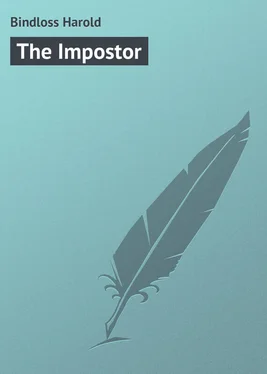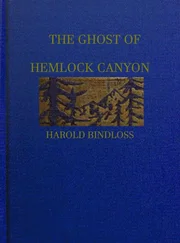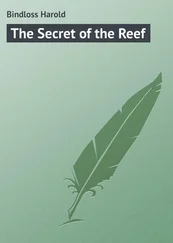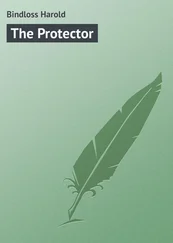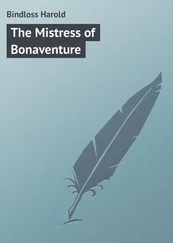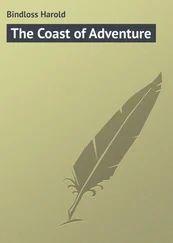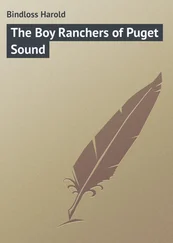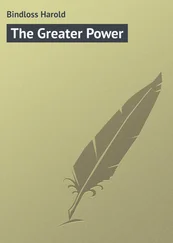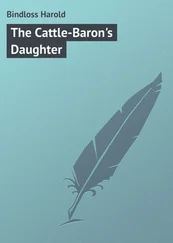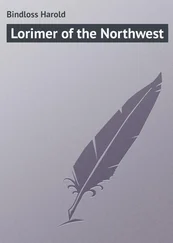Harold Bindloss - The Impostor
Здесь есть возможность читать онлайн «Harold Bindloss - The Impostor» — ознакомительный отрывок электронной книги совершенно бесплатно, а после прочтения отрывка купить полную версию. В некоторых случаях можно слушать аудио, скачать через торрент в формате fb2 и присутствует краткое содержание. Жанр: foreign_prose, на английском языке. Описание произведения, (предисловие) а так же отзывы посетителей доступны на портале библиотеки ЛибКат.
- Название:The Impostor
- Автор:
- Жанр:
- Год:неизвестен
- ISBN:нет данных
- Рейтинг книги:4 / 5. Голосов: 1
-
Избранное:Добавить в избранное
- Отзывы:
-
Ваша оценка:
- 80
- 1
- 2
- 3
- 4
- 5
The Impostor: краткое содержание, описание и аннотация
Предлагаем к чтению аннотацию, описание, краткое содержание или предисловие (зависит от того, что написал сам автор книги «The Impostor»). Если вы не нашли необходимую информацию о книге — напишите в комментариях, мы постараемся отыскать её.
The Impostor — читать онлайн ознакомительный отрывок
Ниже представлен текст книги, разбитый по страницам. Система сохранения места последней прочитанной страницы, позволяет с удобством читать онлайн бесплатно книгу «The Impostor», без необходимости каждый раз заново искать на чём Вы остановились. Поставьте закладку, и сможете в любой момент перейти на страницу, на которой закончили чтение.
Интервал:
Закладка:
Still, he shivered when it was done, and rubbing the knife in the withered leaves, rose and made shift to gird a rug about the uninjured horse. Then he cut the reins and tied them, and mounting without stirrups rode towards the bridge. The horse went quietly enough now, and the man allowed it to choose its way. He was going home to find shelter from the cold, because his animal instincts prompted him, but otherwise, almost without volition, in a state of dispassionate indifference. Nothing more he fancied, could well befall him.
CHAPTER II – LANCE COURTHORNE
It was late when Witham reached his log-built house, but he set out once more with his remaining horse before the lingering daylight crept out of the east, to haul the wagon home. He also spent most of the day in repairing it, because occupation of any kind that would keep him from unpleasant reflections appeared advisable, and to allow anything to fall out of use was distasteful to him, although as the wagon had been built for two horses he had little hope of driving it again. It was a bitter, grey day, with a low, smoky sky, and seemed very long to Witham; but evening came at last, and he was left with nothing between him and his thoughts.
He lay in a dilapidated chair beside the stove, and the little bare room through which its pipe ran was permeated with the smell of fresh shavings, hot iron, and the fumes of indifferent tobacco. A carpenter’s bench ran along one end of it, and was now occupied by a new wagon pole the man had fashioned out of a slender birch. A Marlin rifle, an axe, and a big saw hung beneath the head of an antelope on the wall above the bench, and all of them showed signs of use and glistened with oil. Opposite to them a few shelves were filled with simple crockery and cooking utensils, and these also shone spotlessly. There was a pair of knee boots in one corner with a patch partly sewn on to one of them, and the harness in another showed traces of careful repair. A bookcase hung above them, and its somewhat tattered contents indicated that the man who had chosen and evidently handled them frequently possessed tastes any one who did not know that country would scarcely have expected to find in a prairie farmer. A table and one or two rude chairs made by their owner’s hands completed the furniture; but while all hinted at poverty, it also suggested neatness, industry, and care, for the room bore the impress of its occupier’s individuality, as rooms not infrequently do.
It was not difficult to see that he was frugal, though possibly from necessity rather than taste, not sparing of effort, and had a keen eye for utility, and if that suggested the question why, with such capacities, he had not attained to greater comfort, the answer was simple. Witham had no money, and the seasons had fought against him. He had done his uttermost with the means at his disposal, and now he knew he was beaten.
A doleful wind moaned about the lonely building and set the roof shingles rattling overhead. Now and then the stove crackled, or the lamp flickered, and any one unused to the prairie would have felt the little loghouse very desolate and lonely. There was no other human habitation within a league, only a great waste of whitened grass relieved about the homestead by the raw clods of the fall ploughing; for, while his scattered neighbours, for the most part, put their trust in horses and cattle, Witham had been among the first to realize the capacities of that land as a wheat-growing country.
Now, clad in well-worn jean trousers and an old deerskin jacket, he looked down at the bundle of documents on his knee, accounts unpaid, a banker’s intimation that no more cheques would be honoured and a mortgage deed. They were not pleasant reading, and the man’s face clouded as he pencilled notes on some of them, but there was no weakness or futile protest in it. Defeat was plain between the lines of all he read, but he was going on stubbornly until the struggle was ended, as others of his kind had done, there at the western limit of the furrows of the plough and in the great province further east which is one of the world’s granaries. They went under and were forgotten, but they showed the way, and while their guerdon was usually six feet of prairie soil, the wheat-fields, mills, and railroads came, for it is written plainly on the new North-West that no man may live and labour for himself alone, and there are many who, realizing it, instinctively ask very little, and freely give their best for the land that but indifferently shelters them.
Presently, however, there was a knocking at the door, and though this was most unusual, Witham only quietly moved his head when a bitter blast came in, and a man wrapped in furs stood in the opening.
“I’ll put my horse in the stable while I’ve got my furs on. It’s a bitter night,” he said.
Witham nodded. “You know where the lantern is,” he said. “There’s some chop in the manger, and you needn’t spare the oats in the bin. At present prices it doesn’t pay to haul them in.”
The man closed the door silently, and it was ten minutes before he returned, and sloughing off his furs dropped into a chair beside the stove. “I got supper at Broughton’s, and don’t want anything but shelter to-night,” he said. “Shake that pipe out and try one of these instead.”
He laid a cigar case on the table, and though well worn it was of costly make, with a good deal of silver about it, while Witham, who lighted one, knew that the cigars were good. He had no esteem for his visitor, but men are not censorious upon the prairie, and Western hospitality is always free.
“Where have you come from, Courthorne?” he said quietly.
The other man laughed a little. “The long trail,” he said. “The Dakotas, Colorado, Montana. Cleaned up one thousand dollars at Regent, and might have got more, but some folks down there seemed tired of me. The play was quite regular, but they have apparently been getting virtuous lately.”
“And now?” said Witham, with polite indifference.
Courthorne made a little gesture of deprecation.
“I’m back again with the rustlers.”
Witham’s nod signified comprehension, for the struggle between the great range-holders across the frontier and the smaller settlers who with legal right invaded their cattle runs was just over. It had been fought out bitterly with dynamite and rifles, and when at last, with the aid of the United States cavalry, peace was made, sundry broken men and mercenaries who had taken the pay of both parties, seeing their occupation gone, had found a fresh scope for their energies in smuggling liquor, and on opportunity transferring cattle, without their owners’ sanction, across the frontier. That was then a prohibition country, and the profits and risks attached to supplying it and the Blackfeet on the reserves with liquor were heavy.
“Business this way?” said Witham.
Courthorne appeared to consider a moment, and there was a curious little glint which did not escape his companion’s attention in his eyes, but he laughed.
“Yes, we’re making a big run,” he said, then stopped and looked straight at the rancher. “Did it ever strike you, Witham, that you were not unlike me?”
Witham smiled, but made a little gesture of dissent as he returned the other’s gaze. They were about the same height and had the same English type of face, while Witham’s eyes were grey and his companion’s an indefinite blue that approached the former colour, but there the resemblance, which was not more than discernible, ended. Witham was quietly-spoken and somewhat grim, a plain prairie farmer in appearance, while a vague but recognizable stamp of breeding and distinction still clung to Courthorne. He would have appeared more in place in the States upon the southern Atlantic seaboard, where the characteristics the Cavalier settlers brought with them are not extinct, than he did upon the Canadian prairie. His voice had even in his merriment a little imperious ring, his face was refined as well as sensual, and there was a languid gracefulness in his movements and a hint of pride in his eyes. They, however, lacked the steadiness of Witham’s, and there were men who had seen the wild devil that was born in Courthorne look out of them. Witham knew him as a pleasant companion, but surmised from stories he had heard that there were men, and more women, who bitterly rued the trust they had placed in him.
Читать дальшеИнтервал:
Закладка:
Похожие книги на «The Impostor»
Представляем Вашему вниманию похожие книги на «The Impostor» списком для выбора. Мы отобрали схожую по названию и смыслу литературу в надежде предоставить читателям больше вариантов отыскать новые, интересные, ещё непрочитанные произведения.
Обсуждение, отзывы о книге «The Impostor» и просто собственные мнения читателей. Оставьте ваши комментарии, напишите, что Вы думаете о произведении, его смысле или главных героях. Укажите что конкретно понравилось, а что нет, и почему Вы так считаете.
